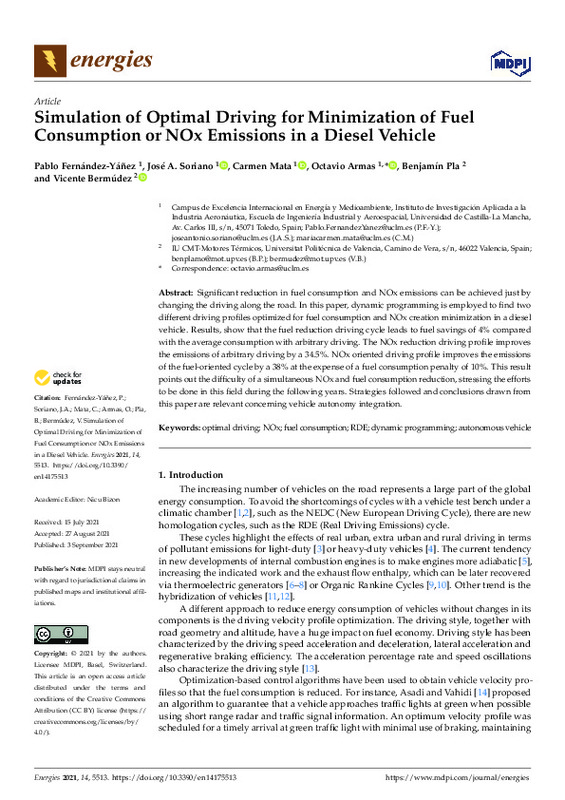JavaScript is disabled for your browser. Some features of this site may not work without it.
Buscar en RiuNet
Listar
Mi cuenta
Estadísticas
Ayuda RiuNet
Admin. UPV
Simulation of Optimal Driving for Minimization of Fuel Consumption or NOx Emissions in a Diesel Vehicle
Mostrar el registro sencillo del ítem
Ficheros en el ítem
| dc.contributor.author | Fernández-Yáñez, Pablo
|
es_ES |
| dc.contributor.author | Soriano, José A.
|
es_ES |
| dc.contributor.author | Mata, Carmen
|
es_ES |
| dc.contributor.author | Armas, Octavio
|
es_ES |
| dc.contributor.author | Pla Moreno, Benjamín
|
es_ES |
| dc.contributor.author | Bermúdez, Vicente
|
es_ES |
| dc.date.accessioned | 2022-05-12T18:06:24Z | |
| dc.date.available | 2022-05-12T18:06:24Z | |
| dc.date.issued | 2021-09 | es_ES |
| dc.identifier.uri | http://hdl.handle.net/10251/182561 | |
| dc.description.abstract | [EN] Significant reduction in fuel consumption and NOx emissions can be achieved just by changing the driving along the road. In this paper, dynamic programming is employed to find two different driving profiles optimized for fuel consumption and NOx creation minimization in a diesel vehicle. Results, show that the fuel reduction driving cycle leads to fuel savings of 4% compared with the average consumption with arbitrary driving. The NOx reduction driving profile improves the emissions of arbitrary driving by a 34.5%. NOx oriented driving profile improves the emissions of the fuel-oriented cycle by a 38% at the expense of a fuel consumption penalty of 10%. This result points out the difficulty of a simultaneous NOx and fuel consumption reduction, stressing the efforts to be done in this field during the following years. Strategies followed and conclusions drawn from this paper are relevant concerning vehicle autonomy integration. | es_ES |
| dc.description.sponsorship | This research was funded by the Spanish Ministry of Science and Innovation, grant number RTI2018-095923-B-C21. | es_ES |
| dc.language | Inglés | es_ES |
| dc.publisher | MDPI AG | es_ES |
| dc.relation.ispartof | Energies | es_ES |
| dc.rights | Reconocimiento (by) | es_ES |
| dc.subject | Optimal driving | es_ES |
| dc.subject | NOx | es_ES |
| dc.subject | Fuel consumption | es_ES |
| dc.subject | RDE | es_ES |
| dc.subject | Dynamic programming | es_ES |
| dc.subject | Autonomous vehicle | es_ES |
| dc.subject.classification | MAQUINAS Y MOTORES TERMICOS | es_ES |
| dc.title | Simulation of Optimal Driving for Minimization of Fuel Consumption or NOx Emissions in a Diesel Vehicle | es_ES |
| dc.type | Artículo | es_ES |
| dc.identifier.doi | 10.3390/en14175513 | es_ES |
| dc.relation.projectID | info:eu-repo/grantAgreement/AEI/Plan Estatal de Investigación Científica y Técnica y de Innovación 2017-2020/RTI2018-095923-B-C21/ES/RECUPERACION DE ENERGIAS RESIDUALES EN VEHICULOS LIGEROS. IMPACTO TECNOLOGICO/ | es_ES |
| dc.relation.projectID | info:eu-repo/grantAgreement/MICINN//EQC2019-005675-P/ | es_ES |
| dc.relation.projectID | info:eu-repo/grantAgreement/AEI//RTI2018-095923-B-C21//RECUPERACION DE ENERGIAS RESIDUALES EN VEHICULOS LIGEROS. IMPACTO TECNOLOGICO/ | es_ES |
| dc.rights.accessRights | Abierto | es_ES |
| dc.contributor.affiliation | Universitat Politècnica de València. Departamento de Máquinas y Motores Térmicos - Departament de Màquines i Motors Tèrmics | es_ES |
| dc.description.bibliographicCitation | Fernández-Yáñez, P.; Soriano, JA.; Mata, C.; Armas, O.; Pla Moreno, B.; Bermúdez, V. (2021). Simulation of Optimal Driving for Minimization of Fuel Consumption or NOx Emissions in a Diesel Vehicle. Energies. 14(17):1-15. https://doi.org/10.3390/en14175513 | es_ES |
| dc.description.accrualMethod | S | es_ES |
| dc.relation.publisherversion | https://doi.org/10.3390/en14175513 | es_ES |
| dc.description.upvformatpinicio | 1 | es_ES |
| dc.description.upvformatpfin | 15 | es_ES |
| dc.type.version | info:eu-repo/semantics/publishedVersion | es_ES |
| dc.description.volume | 14 | es_ES |
| dc.description.issue | 17 | es_ES |
| dc.identifier.eissn | 1996-1073 | es_ES |
| dc.relation.pasarela | S\448121 | es_ES |
| dc.contributor.funder | Agencia Estatal de Investigación | es_ES |
| dc.contributor.funder | Ministerio de Ciencia e Innovación | es_ES |








